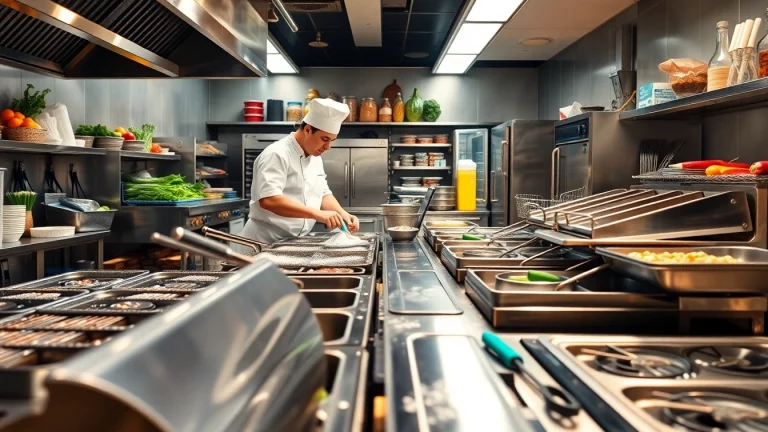
Essential Guide to Efficient Restaurant Cooking Appliance Cleaning Techniques
Understanding the Importance of Restaurant Cooking Appliance Cleaning
In the high-stakes environment of a restaurant, maintaining the cleanliness and functionality of cooking appliances is paramount. Not only does this upkeep ensure the quality of the food produced, but it also enhances the overall safety standards of the establishment. Regular Restaurant Cooking Appliance Cleaning can dramatically influence many aspects of a kitchen, from compliance with health regulations to the efficiency of daily operations.
The Impact on Food Safety
Food safety is a critical concern in any professional kitchen, with health codes designed to prevent contamination and foodborne illness. Dirty cooking appliances, from grease-covered fryers to grimy grills, pose a significant risk to food safety. When equipment is not cleaned regularly, residue builds up, providing a breeding ground for bacteria, which can contaminate food items. For instance, a study found that unclean cooking equipment can increase the likelihood of foodborne pathogens, resulting in potential outbreaks that can damage a restaurant’s reputation and finances.
Enhancing Appliance Longevity
Each cooking appliance in a restaurant represents a significant investment. Regular cleaning directly impacts the lifespan of these machines. For example, a well-maintained fryer can last several years longer than one that is neglected. A buildup of grease or grime can cause overheating or malfunction, leading to costly repairs or premature replacement. By instituting a regular cleaning schedule, restaurants can protect their investments and ensure that all appliances operate at peak efficiency.
Boosting Kitchen Efficiency
A clean kitchen is an efficient kitchen. When appliances are well-maintained and free of obstructions, staff can work more quickly and effectively. This efficiency translates into faster service and improved workflow, allowing kitchen staff to prepare meals more rapidly during busy shifts. Moreover, clean appliances are less likely to break down, reducing unexpected downtime that can disrupt service and lead to dissatisfied customers.
Types of Restaurant Cooking Appliances Needing Regular Cleaning
In every professional kitchen, there is a variety of cooking appliances that require regular cleaning. Understanding which appliances need attention helps streamline the cleaning process and prioritize efforts for maximum benefit.
Grills and Griddles
Grills and griddles experience significant buildup from food residues, grease, and carbon deposits during regular operations. Failure to clean these surfaces can lead to flare-ups and off-flavors in food. Regular scraping and deep cleaning are essential to keep these appliances functional and safe for food preparation.
Fryers and Ovens
Fryers and ovens, critical for many menu items, require special attention due to the oil and residue that can accumulate. Constant exposure to high temperatures can cause old oil to break down, creating potentially harmful substances. Regular filtration and cleaning, including draining old oil and scrubbing surfaces, ensure that these appliances remain in good working order.
Ranges and Hoods
Ranges and kitchen hoods play a vital role in controlling smoke and odors while cooking. These appliances must be cleaned frequently to vent out contaminants and maintain air quality in the kitchen. In addition, hood filters must be cleaned and replaced regularly to ensure safety and compliance with health codes.
Best Practices for Restaurant Cooking Appliance Cleaning
Establishing best practices for cleaning ensures a consistent approach that maximizes efficiency and safety across the kitchen. Here are some key strategies that can be implemented in every restaurant.
Daily Maintenance Tips
Daily maintenance forms the foundation of an effective cleaning regime. Simple tasks can go a long way in preventing buildup and ensuring appliances work properly. Key daily tasks include:
- Wiping down surfaces after each use to prevent grease from hardening.
- Checking for any signs of appliance malfunction and addressing them immediately.
- Emptying grease traps and collecting waste to avoid overflow and contamination.
- Cleaning any tools or utensils that have come into contact with raw ingredients.
Deep Cleaning Procedures
Beyond daily maintenance, deep cleaning is essential to remove hidden grime and buildup. This should be conducted weekly or bi-weekly, focusing on:
- Disconnecting equipment for thorough cleaning behind and beneath appliances.
- Using appropriate cleaning agents that are effective against grease and food residues.
- Ensuring that all components are reassembled correctly to maintain functionality.
- Inspecting seals and other wear-and-tear areas for necessary repairs.
Eco-Friendly Cleaning Solutions
In today’s environmentally conscious climate, utilizing eco-friendly cleaning solutions is increasingly important for restaurants. These alternatives reduce harmful chemical exposure for staff and customers alike. Common eco-friendly measures include:
- Using vinegar and baking soda as a natural abrasive for cleaning tough spots.
- Implementing biodegradable cleaners that break down naturally in the environment.
- Considering steam cleaning methods that use high temperatures to sanitize surfaces without chemicals.
Common Challenges in Restaurant Cooking Appliance Cleaning
While maintaining cleanliness is essential, there are several challenges that restaurant staff may face. Recognizing these obstacles can help in devising effective solutions.
Dealing with Tough Grease Buildup
Tough grease buildup is a common issue that can be a detriment to appliance longevity and food safety. Using specialized degreasers and following a routine that allows for adequate soaking time can greatly assist in breaking down these stubborn residues. Additionally, employing tools designed for heavy-duty scrubbing can speed up the process without damaging appliance surfaces.
Time Management during Cleaning
Cleaning can be time-consuming, especially within busy restaurant settings where every minute counts. To tackle this challenge, restaurants can develop a cleaning schedule that spreads tasks throughout the day or assigns cleaning responsibilities during specific shifts. Staff training can also enhance efficiency by ensuring that everyone understands the cleaning protocols and the importance of maintaining cleanliness.
Ensuring Compliance with Health Regulations
Health regulations on restaurant cleanliness are stringent, and failure to comply can lead to fines or closure. Maintaining a documented cleaning schedule can help ensure that all required tasks are completed. Regular training sessions should be implemented to keep the staff updated on regulations and best practices, fostering a culture of safety and compliance.
Measuring the Effectiveness of Your Cleaning Routine
Measuring the effectiveness of a cleaning routine is crucial to ensure continuous improvement. Employing a systematic approach allows restaurants to make data-driven decisions about their cleaning practices.
Setting Cleaning Schedules
Creating a detailed cleaning schedule that outlines daily, weekly, and monthly tasks can enhance accountability and ensure thorough cleaning. Using checklists that list all required cleaning tasks ensures that no steps are overlooked, fostering a disciplined approach to kitchen cleanliness.
Evaluating Appliance Performance
Regular evaluations of appliance performance can help identify issues early on. If appliances are showing signs of decreased performance, such as longer cooking times or uneven heating, it may indicate an inadequate cleaning routine. Keeping maintenance logs can facilitate this evaluation, providing insight into when issues arise and prompting timely interventions.
Feedback from Kitchen Staff
The kitchen staff plays a critical role in identifying the effectiveness of cleaning routines. Regular feedback sessions can be implemented to discuss pain points, successes, and suggestions for improvement. Encouraging open communication fosters a sense of teamwork and invests the staff in the quality of kitchen operations.


